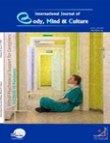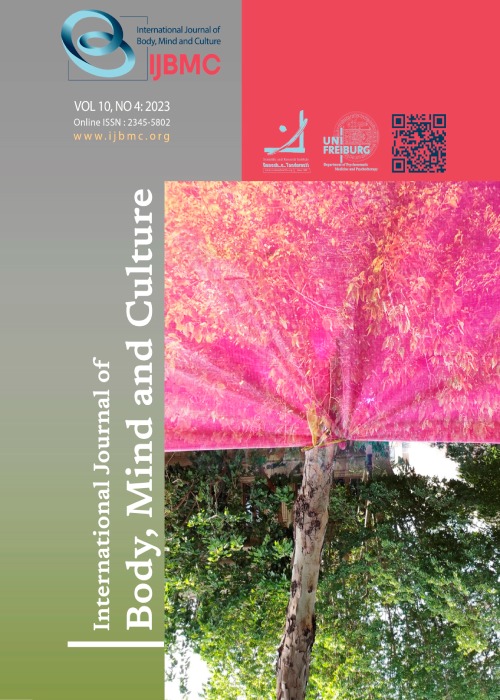فهرست مطالب

International Journal of Body, Mind and Culture
Volume:8 Issue: 2, Spring 2021
- تاریخ انتشار: 1400/02/11
- تعداد عناوین: 9
-
Pages 75-77
-
Pages 78-84
The Covid-19 virus crisis is related to virology, medicine, politics, economy, lockdown, the constitution, masks, the future, and short-time work. But what about the mental health of the medical practitioners on the frontline? Experiences and research in China provide not only an insight into the almost superhuman medical performance, but also the most extreme mental stress and strain of these same practitioners. Some of the key conclusions derived from these studies may be of interest to practitioners in other countries.
Keywords: Corona Crisis, Mental Stress, Stress Management, Anxiety, Depression, China -
Pages 85-92
The Olympiad for Medical Sciences Students has been held in the field of medical humanities for several years in Iran. This year, with the outbreak of the corona pandemic, the question arose as to whether this student competition could be adapted to this new and complex situation. This article will explain the joint efforts of the scientific committee and biomedical students to address this challenge. The main question we had to answer was whether the medical humanities have anything to say in the face of the corona pandemic. The danger we felt was that as the corona pandemic crisis deepened, the biomedical narrative would fill the entire discourse, and this would ultimately lead to the ineffectiveness of corona interventions and policies. This paper shows how these questions were addressed through an action research that the scientific committee, as an interdisciplinary team, and several groups of medical students have worked on together. The result showed that criticism of classical medical humanities, return to the roots of interdisciplinarity, attention to the role of technology, and the crucial role of biopolitics are the neglected aspects of the Covid 19 pandemic.
-
Pages 93-100
The essay mirrors the process of self-experience of a German body-psychotherapist who came into contact with the corona crisis already in the beginning of January 2020. The author`s close virtual communication with colleagues in China by social media opened up a process of mutual experience and support on body oriented and psychological crisis counselling. This process challenged both: the Chinese colleagues and and the author in the way that one had to find a way, a relationship and a (self-) support to navigate without a compass, without a best practice just like living in a dense fog. The author decided to choose the literary form of an essay to invite interested readers to take part as if they were "part of the game". The author is convinced that this literary form is the adequate form to communicate such an experience in such a strange and scary time. The author is also convinced that this form is the adequate professional response in order not to create the impression of "we know what it is all about and we know what is to be done".
Keywords: Self-Experience, Self-Support, Corona -
Pages 101-114
job burnout, depression, and anxiety, which can affect the healthcare systems and societies. This has been intensified by the outbreak of the Covid-19 pandemic. Many of the caregivers’ problems are due to insufficient psychosocial competence and lack of suitable training for basic skills such as self-awareness, rapport, empathy, compassion, reasoning, decision-making, etc. The main purpose of this study was to design a psychosocial service package for caregivers to help them throughout their lives.
MethodsData gathering was performed by conducting 2 focus groups, searching for studies to identify urgent and important healthcare needs, and finding the best way to address their necessities through a proactive and sustainable method.
ResultsThe online “healers' healing” platform is designed with 3 general objectives. The first objective was to present practical and effective materials to support caregivers in order to improve their psychosocial competence. The second objective was to monitor the member's progress and measure the effectiveness of the program. Moreover, to make the members more active in training and their own health promotion, this platform leads and supports self-help groups for caregivers as the third purpose of this project. Furthermore, healers can be active in content development and community education in order to experience a more productive interaction within the communities of caregivers.
Keywords: Caregivers, Burnout, Compassion Fatigue, Empathy, Psychosocial Support System, Online Learning -
Pages 115-125Background
The aim of the present study was to determine the challenges of medical students in the clinical education environment during the outbreak of Covid-19 to understand their experiences.
MethodsThis qualitative study was performed based on the hermeneutic phenomenological approach and Van Manen’s analytical method from 10th of August to 12th of September 2020 in different departments of Qazvin University of Medical Sciences, Iran. In this phenomenological study, using the purposive sampling method, the participants were selected from among medical students. The data were collected through semi-structured interviews with 12 medical students. All the interviews were recorded and transcribed, and then, the codes, categories, and themes were extracted using Van Manen’s analytical method.
ResultsThe 5 main themes of the present study were ‘inefficient clinical education’, ‘dealing with real work conflicts’, ‘the future professional challenges’, ‘the challenges related to organizational policy’, and ‘the challenges related to the sense of stigma among the medical staff’. The most important challenges consisted of ‘moving away from the educational goals due to reduced attendance at the clinical setting’, ‘the cancellation of some clinical courses’, ‘the creation of stress in the students by professors’, ‘fear of getting sick and transmitting the disease to family members’, ‘fatigue and heavy sweating due to caring for a large number of patients while wearing isolation gowns’, ‘the prolongation of the students’ studies and delay in starting their thesis’.
ConclusionThe results of this study provided a deeper insight into the perceptions, feelings, and experiences of medical students during the coronavirus pandemic.
Keywords: Education, Medical Students, COVID-19 -
Pages 126-134Background
Caring for people with disabilities creates stressful conditions and may lead to mental health problems in parents and caregivers. The aim of this study was to investigate somatic symptoms, depression, and anxiety in parents and caregivers of individuals with disability in Isfahan, Iran. This study was conducted as a joint study by Isfahan University of Medical Sciences and the University of Hamburg with financial support from DAAD.
MethodsThis cross-sectional study was performed on 454 parents/caregivers of people with disabilities in Isfahan in 2019. Randomized sampling was performed and participants were selected according to the inclusion criteria. The Patient Health Questionnaire-9 (PHQ-9) (Depression), PHQ-7 (Anxiety), and PHQ-15 (Somatic) were used for data collection. Questionnaires were distributed among the participants and completed with the coordination and cooperation of the government and NGOs related to people with disability. Data were analyzed using descriptive statistics (mean and standard deviation) and analysis of variance (ANOVA) in SPSS software.
ResultsThe results showed that 28.4% of parents/caregivers of people with disabilities did not have any depressive symptoms and the remaining 70% experienced mild to severe levels of depressive symptoms. Regarding the level of anxiety, 30.2% showed no symptoms of anxiety and 69.8% showed mild to severe levels of anxiety symptoms. In terms of somatic symptoms, 17.8% reported no somatic symptoms and 82.2% reported mild to severe levels of somatic symptoms. Parents/caregivers differed significantly in terms of depression, anxiety, and somatic symptoms according to the type of disability.
ConclusionThe findings of the present study show that the rate of symptoms of depression, anxiety, and somatic symptoms in parents/caregivers of people with disabilities is higher than that in the general population. In addition, different types of disability can have different effects on the mental health of parents/caregivers.
Keywords: Depression, Anxiety, Somatic Symptoms, Parent, Caregivers, Disability -
Pages 135-140
This practical report shows a possibility of psychosocial support for cancer patients in an online format by means of "Art Therapy at Home" and is intended to stimulate discussion about how patients can be supported virtually during the pandemic. The project "Art Therapy at Home" illustrates how profitable virtual art therapy can be for patients despite social distancing and what different possibilities exist. At the same time, the limits and disadvantages, such as the limited interpersonal interaction while using the digital medium, become visible and demonstrate that personal contact cannot be fully replaced.
Keywords: Virtual Art Therapy, Cancer, COVID-19 Pandemic -
Pages 141-153
The world has encountered a pandemic named Covid-19 that has affected people’s lives in numerous dimensions. During this ongoing dramatic and stratified period, we have been shattered globally in various layers. As 12 students of the first Body-Oriented Clinical Psychology master's program at Maltepe University in Turkey, we experienced uncertainty caused by the pandemic accompanied with online Body-Oriented Psychotherapy classes. Our experiences in Turkey, mostly Istanbul between mid-March and June, 2020 can be an example of reacting with uncertainty to the unexpected Covid-19 pandemic and may highlight the role of the body coping. In this article, we intended to reflect our pandemic experiences of significant changes in our lives. We examined our perception of the new normal as ‘Body-Oriented Clinical Psychology students’ in our reflections with distinct and common experiences. In addition, we covered the experiences of body awareness, embodiment, emotions, and interpersonal relationships while coping with the coronavirus. Our reflections revealed that the uncertainty of online education and other circumstances during this time caused anxiety and anger, while body-oriented courses helped us feel regulated and attuned. Sharing our experiences and evaluating the effects of our education on these experiences of lock-downs were important in gaining a better understanding of the circumstances in order to determine helpful solutions.
Keywords: Body-Oriented Psychotherapy, Covid-19, Coping, Uncertainty


